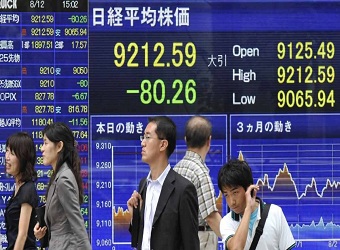Japan’s benchmark Nikkei 225 declined 1.14 percent, with most sectors — including automakers, technology, manufacturing and financials — trading in negative territory.
Major exporters traded lower following the dollar’s overnight fall against the yen. Fanuc Manufacturing shed 0.88 percent and Nintendo fell 1.73 percent. Oil-related stocks were a mixed picture after earlier outperforming as oil prices rose to their highest levels since December 2014.
The Nikkei 225 had notched a fresh 26-year high earlier in the week.
Over in South Korea, the Kospi rose 0.79 percent, with recent earnings reports in focus.
Shares of SK Hynix rose 4.28 percent after the chipmaker announced Thursday that fourth-quarter operating profit came in at a record high of 4.47 trillion won ($4.42 billion). Annual operating profit for 2017, meanwhile, stood at a record 13.7 trillion won ($12.9 billion), which the company attributed to a rapid growth in overall memory demand.
Meanwhile, Posco stock reversed early losses to rise 1.03 percent after the steelmaker reported earnings on Wednesday.
Down Under, the S&P/ASX 200 edged down by 0.08 percent as gains in the materials sector were offset by losses in utilities and industrials. Gold producers were up 2.81 percent after the metal’s prices rose to their highest levels in one and a half years on the softer dollar.
The heavily-weighted financials sector traded lower for the most part.
Greater China markets were under pressure in the early going. Hong Kong’s Hang Seng Index slipped 0.31 percent after closing higher for the seventh straight session on Wednesday. Financials were broadly lower, with China Construction Bank declining 1.03 percent and HSBC off by 0.23 percent.
Technology names were also in negative territory, with heavyweight Tencent losing 0.98 percent. Energy-related names extended gains as oil prices climbed. Petrochina rose 2.9 percent and CNOOC gained 1.09 percent.
Mainland markets were subdued. The Shanghai composite edged down 0.14 percent and the Shenzhen composite inched lower by 0.01 percent.
Major mainland-listed banks saw declines, with Industrial and Commercial Bank of China down by 1.76 percent. Real estate names were also broadly in negative territory: China Vanke fell 3.45 percent and Poly Real Estate lost 4.65 percent.
U.S. stocks closed mixed on Wednesday despite touching all-time highs earlier in the session. The moves came as markets focused on a mix of corporate earnings, trade war concerns and the broad decline in the U.S. currency.
The dollar remained on the back foot after tumbling following U.S. Treasury Secretary Steven Mnuchin’s comments that a weaker greenback was good for the country. Commerce Secretary Wilbur Ross later told CNBC that Mnuchin’s remarks should not be seen as advocacy for a weaker dollar.
At 12:48 p.m. HK/SIN, the dollar index, which tracks the U.S. currency against a basket of rivals, slipped to trade at 88.994 after earlier falling to a fresh three-year low. Against the yen, the dollar traded at 108.96, below Wednesday’s close of 109.24.
Those developments came after President Donald Trump approved tariffs against imported solar cells and certain washing machines. The move, while seen as having a small economic impact for now, had raised some concerns over future trade moves in the region. South Korea and China also spoke out against the tariffs earlier in the week.
The euro, meanwhile, firmed to trade at $1.2435, above it’s overnight high of $1.2415. The move in the euro also came ahead of the European Central Bank’s interest rates decision on Thursday during Europe hours.
“There’s no doubt in our minds that [ECB President Mario] Draghi will try to jawbone the currency by expressing his discontent with its rapid rise, but that may not be enough to reverse the uptrend in the euro,” BK Asset Management Managing Director of FX Strategy Kathy Lien wrote in a note.
On the energy front, oil prices extended gains to touch their highest levels since December 2014 on Thursday. U.S. crude futures advanced 0.96 percent to trade at $66.24 per barrel.
Brent crude rose 0.62 percent to trade at $70.97 after earlier breaking above the $71 mark for the first time in around three years.
Source: CNBC
